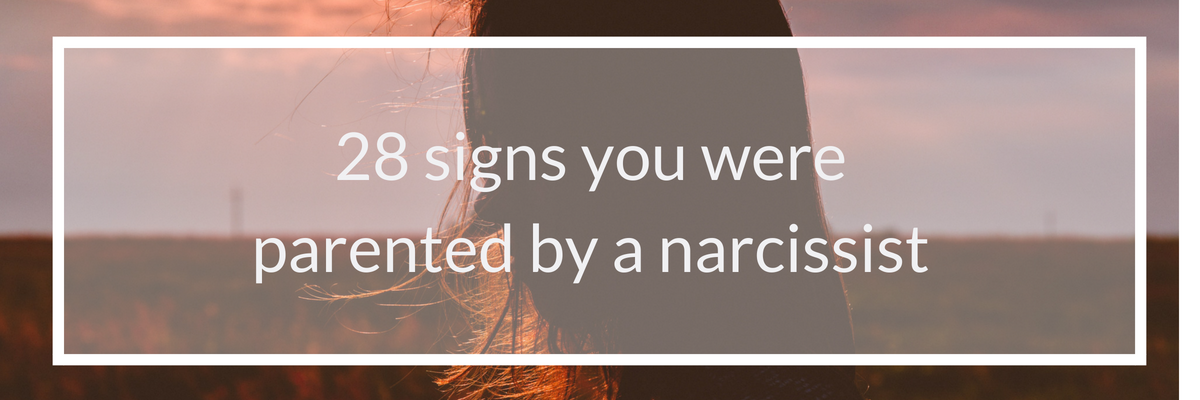You may already be thinking, why does your relationship with your parents feel so out?
Life might feel overwhelming, confusing and lonely as a consequence.
Sometimes, it’s hard to know what you feel or how to shake off the anxiety and second guessing.
If you’ve landed here, you might already have an inkling that one of your parents is a narcissist.
If that’s the case, I know how difficult life can feel and want to reassure you there’s a lot you can do to change how you feel.
The good news is, once you know what you’re dealing with, both in your inner world, and your relationships, things can get better.
In this in depth post you’ll find loads of really practical advice and insights into:
- The different types of narcissistic parents
- The narcissistic parent signs you might want to look out for, including a narcissistic parent checklist
- The potential impact of narcissistic parents and narcissistic abuse on you
- 28 signs that you were parented by a narcissist
- A roadmap for narcissistic abuse recovery
- How you can start to make changes by yourself right away
Life after narcissistic abuse

This is how life can feel after parental narcissistic abuse:
Things seem ok on the surface, but they really aren’t, on the inside.
It’s hard to put your finger on exactly what’s wrong.
Sometimes you just feel empty. Or alone.
You second guessing yourself.
Your self-confidence is at an all time low.
You don’t always trust what you think about things. And it might be even harder to say what you truly feel.
As if it’s hard to know what any given feeling is.
For a long time, maybe you’ve just accepted this is how it is. But now, perhaps you’re starting to question things.
You might also wonder:
- Why do your friends always seem to take advantage or know how to get you to agree to things?
- Why, everytime you visit your parent(s), do you feel low and even unwell?
- Why you get irritable and snappish with those you’re close to?
- Why you keep falling out with your sibling(s)?
- Why do you feel so low about your life even though you seem to have done stuff and made something of your life?
- Why do you feel envious of others who seem to have it ’sorted’
These feelings and questions are typical of those who have experienced parental narcissistic abuse.
Or a form of emotional neglect in childhood.
Obviously (Obviously!), I can’t diagnose a third party or truly know this, but having worked with very many children of a narcissistic parent, I recognise the patterns of neglect and abuse.
So this article is about two different things that might help you right now:
- the traits of a narcissistic parent and how to spot them
- the possible impact on you of being parented this way
Putting the two together, might help you start to piece together the different bits of your life’s jigsaw.
A word of caution
Here’s the thing:Narcissism is everywhere in the press with people diagnosing themselves and others willy nilly.
There is only one diagnosable disorder in relation to narcissism and that is Narcissistic Personality Disorder. This is a psychiactric diagnosis made according to strict criteria. It’s very hard to treat.
Those with this disorder act out in the most extreme ways which can be very harmful to others.
But that’s not the whole story:Everyone, including you and me, will have narcissistic traits in our personality. Narcissism is on a spectrum. At one extreme end is the full disorder, at the other what is sometimes called ‘Echoism’ .
We all need some narcissism. Call it healthy self-esteem and suddently it doesn’t feel so bad.
The flip side of narcissism: echoism
Echoism is the opposite of NPD, where someone has so little sense of self and value that they are self-effacing to the point of creating suffering in their lives.
Craig Malkin in his excellent book Rethinking Narcissism offers a 10 point scale from Echo to Narcissist and this can be helpful as a way of understanding the different extremes.
Where would you put yourself?
Why we should stop the cycle of shaming
Although I’m exploring the traits of a narcissist here, I want to make something really clear:
I understand that a narcissistic parent can cause enormous, life altering pain to their children and family. The damage to self-esteem and self-confidence can feel irreperable (even if, in reality, it can be repaired).
However, I’m not in the business of villifying the narcissist. Neither am I an apologist for them. Their behaviour might be unacceptable, but the more you try to understand why they behave that way, the less likely you will dehumanise them and yourself in the process.
You see:For many people I work with, feelings for their parents are immensely complicated. Split between the love that most children feel and long for from a parent, and enormous shame, rage at how they’ve been parented.
Even those who choose to have no contact with their parent do so with immense conflict and rarely if ever, wishing their family ill.
I think it’s really important to say that, because so much of what I read continues the cycle of shaming and counter shaming that is endemic in the narcissistic family system.
And yet:Breaking out of that, firstly in shaming yourself less or not at all, is a massive step in the healing process.
Equally important is not resorting to shaming the parent (who in anycase will either respond explosively or with complete collapse, depending on how their narcissism manifests.)
Finding ways to shame yourself less or not at all, is a massive step in the healing process from #narcissisticabuse Share on XSo, is my parent a narcissist?
Let’s have a look at the traits of the narcissistic parent. I’m thinking of someone who might score between 7 and 9 on the scale, rather than full blown NPD.
To do this, I’m going to use three different categories of narcissist:– the Extraverted Narcissist– the Introverted Narcissist– the Communal Narcissist
The extraverted narcissistic parent
 Let’s get started with the most visible one:
Let’s get started with the most visible one:
Ask most people what their impression of a narcissist personality is and they’ll describe the grandiose narcissist.
Typically this person will:
- Always have to be right / have the last word
- Be hyper critical or demeaning of others
- Be achievement or outcome focused
- Be appearance focused
- Be emotionally unreadable and unavailable
- Be highly focused on their self image
- Lack empathy
- Lie to protect their self-image
- Not take responsibility for what (s)he does and how it impacts you
How does as extraverted narcissist, parent?
As a parent, they may well:
- Act one way in public, including magnetic charm but be controlling and manipulative at home
- Only seem to give approval when you behave or achieve something that reflects well on them
- Belittle or denigrate
- Be absent and indulging in personal needs at the expense of others
- Objectify you and fail to see you as an autonomous individual
- Be jealous of you
- Insist their experience tops yours
Introverted narcissist
 What’s an introverted narcissist like? Not so easy to spot.
What’s an introverted narcissist like? Not so easy to spot.
But the impact of their behaviour can still just as devastating. Typically this person will:
- Be very self-absorbed – you’ll get a sense, through silences, stares, eye rolls that what is going on for them is far more important than what is going on for you
- Be emotionally controlling through their silences, passive agression, cold shouldering
- Lack real empathy for your experiences
- Be very sensitive – the slightest hint of criticism or disagreement can lead to all of the above
- Be ostentatiously modest – being over pre-occupied with down playing their qualities to try and elict approval and admiration
- Not take responsibility for what (s)he does and how it impacts you
- Be possibly quite depressive at times
How does an introverted narcissist, parent?
As a parent, they may well:
- Be intrusive and unboundaried
- Need to be parented by their child
- Be hyper sensitive and collapse or cry when triggered
- May have somatic illnesses that seem to incapacitate them
- Use silences and passive agression to get their emotional needs met
- Make you feel ashamed for making your own decisions or separating from them
- Completely ‘infect’ the family with their mood
- Act as the martyr in the family
- Make you act in a different way than what you feel
The communal narcissist
 What does a communal narcissist look like?
What does a communal narcissist look like?
The communal narcissist is a relatively new category in the research and describes the person who’s emotional needs for high esteem are met by their seemingly wonderful acts in relation to others. For these people, their identity might be wrapped up in showing themselves to be:
- the most giving to their community
- the most loyal and effective friend
- the most caring person in their circle
- enriching the lives of others
- the best parent possible
None of these traits in themselves is problematic, but for the communal narcissist, there isn’t value in the being or doing of those things. It’s the accolade and affirmation from others earned by doing those things which feeds them.
How does a communal narcissist, parent?
As a parent, the communal narcissist will:
- be outwardly focused, being the best neighbour, churchgoer, charity fundraiser etc to the exclusion of the family’s wellbeing in some cases
- be energised around presenting the family as an image of perfection (sharing improbably frequent joyous occasions on social media for example)
- be often telling the story of how exhausted they are from all the good works they do
- not be easily show deep emotion about their causes – it’s more about the admiration
- won’t take responsibility for what (s)he does and how it impacts you
28 signs you were parented by a narcissistic
 Now we’ve seen about the parents:it’s all about you.
Now we’ve seen about the parents:it’s all about you.
This might be uncomfortable, right?
Well that’s one of the impacts of being parented by a narcissist or experiencing childhood emotional neglect.
So far, we’ve looked at how the 3 types of narcissist might be characterised and how their personality may have impact their presence as a parent.
But what about the effect on you, of being parented this way?
Here’s are 28 other ways that being parented by a narcissist might impact you:
- You feel like you know others’ feelings better than your own
- You feel alone and on the outside
- You second guess yourself a lot of the time
- Your instinct is take care of others (but not yourself)
- You may experience social anxiety or find groups difficult
- You feel you have to be the one to fix things when they go wrong in relationships
- You find it hard to trust or you need approval so much that you trust too quickly
- You may find yourself in work or friendship situations where you a bullied or marginalised
- You have an ambivalent relationship with your body
- You numb out including sometimes having out of body experiences
- You have bouts of anxiety and or depression
- You feel powerless to change at times
- You tend towards perfectionism
- You often end up people pleasing rather than being in conflict
- You feel guilty but you don’t know why
- You feel if someone really got to know you they’d see what a bad or flawed person you are
- You need to have a lot of control in your life
- You respond very strongly when you feel controlled
- You have periods of great quiet and then explosions of anger
- You have unexplained illnesses and physical ailments
- You blush a lot
- You feel irritable but can’t explain why
- You find social situations challenging
- You feel there’s something wrong with you but you can’t say why
- You tend to assume you are in the wrong
- You feel like you are faulty or unloveable
- Your inner critical voice is very very loud
- You have emotional flashbacks when triggered in certain situations – it takes you back to feeling like a child
You might experience just a few of these, many or even most.
How does that translate into how you experience your life? Let’s look at an example.
Ellen’s story* – Case study
*Ellen is a fictitious client, a composite of what I see in many of my clients
Ellen’s just turned 36 and to most people, her life seems really good. She has a long term relationship and a child from an previous partner.
She’s done pretty well in her career. Advanced quickly to a management role. She’s well thought of. Takes her job seriously, is very reliable and diligent in her work.
She’s got a good crop of friends, a few she really relies on.
But Ellen doesn’t enjoy life much. She has this restless feeling that there could be so much more. She feels really alone, inspite of the people around her in her life.
Whenever colleagues or bosses praise her, she shrugs it off. Feels it’s somehow good luck, that there are so many people better than her, that she’s a bit of an impostor.
At home, her relationship ebbs and flows. Her mum really doesn’t like her current boyfriend and makes that clear, overtly and subtly whenever she can.
This makes Ellen doubt herself too. As do her mum’s many other passing comments, about her appearance, her choice of clothing, her taste in furniture, her status at work. Her mum always has an opinion, and Ellen feels she’s always falling short.
Occasionally they have a massive bust up, but Ellen’s learned to keep quiet and swallow her frustration. She always has to apologise and sometimes her dad intervenes asking her to smooth things over.
She feels empty and let down when that happens.
Increasingly, she’s dreading family occasions. In the lead up she often develops a bug or chronic headache. She becomes irritable with her daughter and partner and snaps at work.
She religiously calls her mum on a Sunday evening but the conversations are one sided and Ellen has given up saying much about her life.
Her mum monopolises the space and talks either about the terrible things her neighbours are up to or monologues about how tired and in what pain she is, from all the work she does maintaining the house and garden.
Ellen wants to have some sort of relationship with her parents. She loves them but also finds the contact increasingly unbearable.
She feels deep shame and guilt about that, as if it’s disloyal and ungrateful for the money and time her parents invested in her and her education.
She’s going round in circles, and on the horizon, depression is threatening.
She doesn’t know what to do. And is convinced there must be something wrong with her. She just doesn’t know what.
Ellen is typical of someone who’s caught in the narcissistic trap with her parents.
How to get over parental narcissistic abuse and childhood emotional neglect
 So here’s the good news:
So here’s the good news:
When someone comes into therapy with this experience, the process of healing can begin.
Just getting through the door is a major step, as reaching out for help can feel deeply shameful for someone who’s always used to sorting it all out by themselves.
The 4 Stages of Healing from Parental Narcissistic Abuse: From Self-doubt to Self-belief TM
Although everyone’s healing process is unique, I’ve developed a four stage process to transform the inner pain into inner peace.
Here it is:
Stage 1: Give in to the Grief, Release the Rage
Acknowledging and accepting that life isn’t what you want it to be is a major deal. As is seeing that your childhood didn’t give you want you needed.
This is the starting point. To see the story of your life so far, for what it is. With both highs and lows.
Stage 2: Awaken your Awareness
Developing a relationship with yourself, perhaps for the first time in your life, comes next. This means, really learning to notice your thoughts, feelings and body and all the information they give you about what you want and need.
With that, you can explore all the different parts of you, including, most importantly at this stage, the hurt child within you and the inner critic.
Later, you’ll get to meet and know other parts of yourself which have been neglected or quietened.
You sow the seeds of self-compassion. A feint light is lit that reminds you, none of this was your fault.
Stage 3: Reach for your Rich Resources
As you start to get to know yourself, you begin to build the resilience and resources to lead life as you want it. A big part of this work is to establish appropriate boundaries and learn to say no.
You start to discern which relationships serve you and which sap you. Maybe you start to shed those that no longer support you. And gather around you those who can help you through this stage of your journey in life.
Stage 4: Hold out for your Hope
Moving through the first three stages, starts to open up new possibilities for you. The foundations for hope have been laid and with that self-confidence and self-esteem continue to build.You’ll find yourself thinking more widely and deeply about what you want for your life.
You might start to think, perhaps for the first fime, about your deeper purpose, a question which is impossible to answer when you don’t really know what you feel, without second guessing yourself.
At the heart, you start to believe you are truly loveable for who you are.
4 stages to healing from parental narcissistic abuse: 1 feel grief and rage 2 develop self-awareness 3 gather resources 4 find hope #narcissistic abuse Share on XWhat can you do for yourself now?
 Looking to do this yourself? Start here (or download my guide on the secret to recovering from parental narcissistic abuse here):
Looking to do this yourself? Start here (or download my guide on the secret to recovering from parental narcissistic abuse here):
Awaken your Awareness
If you’re here, I’m guessing you’re already thinking about your life and relationship with your parents. That’s a great step and so important.
There’s a lot you can do to develop your awareness:find out as much as you can about childhood emotional neglect and narcissistic abuse. See what fits with your experience and what’s different.
Start journaling or writing about your experiences. Writing is a proven technique for developing both awareness and distance from your emotions, so you can understand and process them more effectively.
Developing mindfulness skills is also helpful. Mindfulness is simply about being aware of your experiences, in the present moment, with kindness and without judgment.
Starting to observe how you are feeling and thinking in response to your environment and relationships, opens up the possibility of making differnent choices now and in the future.
Develop Soothing Self compassion
Developing and working on kindness to yourself is a major step in feeling differently about your life and self. The first step is noticing your inner critic and starting to quieten them.
Changing the script from ‘You’re so stupid / useless / lazy / ugly’ or whatever plays out for you to kinder substitutes’ You’re struggling and doing your best; you’re a good and kind person’ you’re learning new ways etc.’
Set Brilliant Boundaries
Perhaps the hardest thing for someone who’s had an experience of emotional neglect or narcissistic abuse, is to find the courage to say no.
Why does it take courage? Because saying no probably evokes a deep fear at quite a visceral level. The fear of being abandoned or left, loathed or shouted at.
And yet the no is the essential step in reclaiming the territory of your life for your self, so you start to live it on your terms, for you.
Doing that is scary. It needs you to know what you want and need too. All part of a big learning curve if you’ve experienced abuse.
Get Super Support
Although your instinct is to do this by yourself, you’re here, considering help. Getting support is really helpful and important for recovery from narcissistic abuse and neglect.
It doesn’t have to be professional support, though that helps too. It could be through an online forum, Facebook group or a trusted friend who can listen without judgment and with kindness to what you’re going through as you start to make important changes in your life
If you need more help and don’t want to face this alone…
I’m here for you. Experienced in this stuff. Passionate about seeing people recover and rediscover their self-confidence and belief after narcissistic abuse. To schedule your free initial consultation, get in touch via email or call / text me on 07443 640556.
